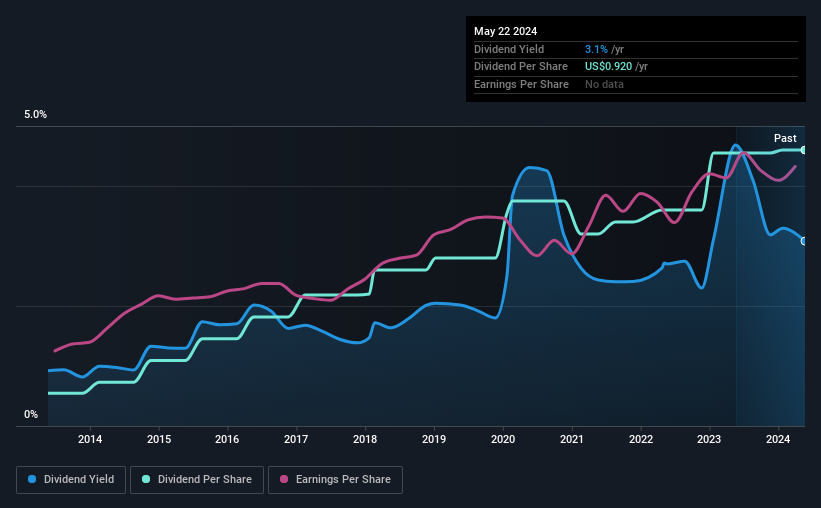Peoples Bancorp of North Carolina (NASDAQ:PEBK) Will Pay A Dividend Of $0.19
The board of Peoples Bancorp of North Carolina, Inc. (NASDAQ:PEBK) has announced that it will pay a dividend on the 14th of June, with investors receiving $0.19 per share. This means the dividend yield will be fairly typical at 3.1%.
See our latest analysis for Peoples Bancorp of North Carolina
Peoples Bancorp of North Carolina's Earnings Will Easily Cover The Distributions
Solid dividend yields are great, but they only really help us if the payment is sustainable.
Peoples Bancorp of North Carolina has a long history of paying out dividends, with its current track record at a minimum of 10 years. Taking data from its last earnings report, calculating for the company's payout ratio shows 25%, which means that Peoples Bancorp of North Carolina would be able to pay its last dividend without pressure on the balance sheet.
If the trend of the last few years continues, EPS will grow by 6.1% over the next 12 months. If the dividend continues along recent trends, we estimate the future payout ratio will be 32%, which is in the range that makes us comfortable with the sustainability of the dividend.
Dividend Volatility
The company's dividend history has been marked by instability, with at least one cut in the last 10 years. The dividend has gone from an annual total of $0.109 in 2014 to the most recent total annual payment of $0.92. This works out to be a compound annual growth rate (CAGR) of approximately 24% a year over that time. It is great to see strong growth in the dividend payments, but cuts are concerning as it may indicate the payout policy is too ambitious.
Peoples Bancorp of North Carolina Could Grow Its Dividend
Growing earnings per share could be a mitigating factor when considering the past fluctuations in the dividend. Peoples Bancorp of North Carolina has seen EPS rising for the last five years, at 6.1% per annum. Growth in EPS bodes well for the dividend, as does the low payout ratio that the company is currently reporting.
In Summary
In summary, we are pleased with the dividend remaining consistent, and we think there is a good chance of this continuing in the future. The payout ratio looks good, but unfortunately the company's dividend track record isn't stellar. This looks like it could be a good dividend stock going forward, but we would note that the payout ratio has been at higher levels in the past so it could happen again.
Investors generally tend to favour companies with a consistent, stable dividend policy as opposed to those operating an irregular one. Meanwhile, despite the importance of dividend payments, they are not the only factors our readers should know when assessing a company. For example, we've picked out 2 warning signs for Peoples Bancorp of North Carolina that investors should know about before committing capital to this stock. Is Peoples Bancorp of North Carolina not quite the opportunity you were looking for? Why not check out our selection of top dividend stocks.
Have feedback on this article? Concerned about the content? Get in touch with us directly. Alternatively, email editorial-team (at) simplywallst.com.
This article by Simply Wall St is general in nature. We provide commentary based on historical data and analyst forecasts only using an unbiased methodology and our articles are not intended to be financial advice. It does not constitute a recommendation to buy or sell any stock, and does not take account of your objectives, or your financial situation. We aim to bring you long-term focused analysis driven by fundamental data. Note that our analysis may not factor in the latest price-sensitive company announcements or qualitative material. Simply Wall St has no position in any stocks mentioned.

 Yahoo Finance
Yahoo Finance 
